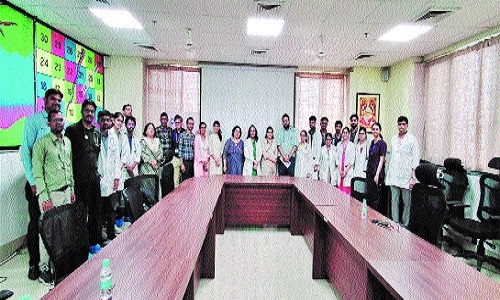AIIMS takes lead in rare disease awareness with session on ‘Lysosomal Storage Disorders’
| Date :25-Apr-2024 |

Staff Reporter
In a significant stride towards addressing rare diseases, AIIMS Bhopal, under the leadership of Professor (Dr) Ajai Singh, Executive Director, has been recognised as a Center of Excellence (CoE) for rare diseases by the Government of India. This recognition paves the way for patients to register for financial aid from both governmental and voluntary organisations, ensuring they have access to essential treatment and support services. On Tuesday, the Department of Paediatrics at AIIMS Bhopal organised a crucial awareness session focusing on Lysosomal Storage Disorders (LSDs). LSDs are a group of inborn errors of metabolism characterised by the accumulation of excess substrates in various cells due to defective lysosomal function. This accumulation can lead to dysfunction of affected organs, resulting in severe morbidity and mortality.
Despite being rare, these disorders can manifest at any age, from infancy to childhood, presenting significant life-threatening challenges. Aligning with the National Rare Disease Policy, treatments are available for LSDs. Early diagnosis is crucial for managing these disorders effectively, as timely intervention can potentially save lives. By hosting this awareness session, AIIMS Bhopal aims to boost survival rates and enhance the overall quality of life for individuals affected by LSDs, as per the reports.
According to the hospital administration, the event witnessed enthusiastic participation from over 50 resident doctors and staff members, underscoring their collective commitment to addressing rare diseases with diligence and compassion. The program was organised in collaboration with Sanofi India, highlighting the collaborative efforts between the healthcare sector and the pharmaceutical industry to tackle rare diseases effectively. With initiatives like these, AIIMS Bhopal continues to demonstrate its dedication to advancing healthcare and improving outcomes for patients with rare diseases.